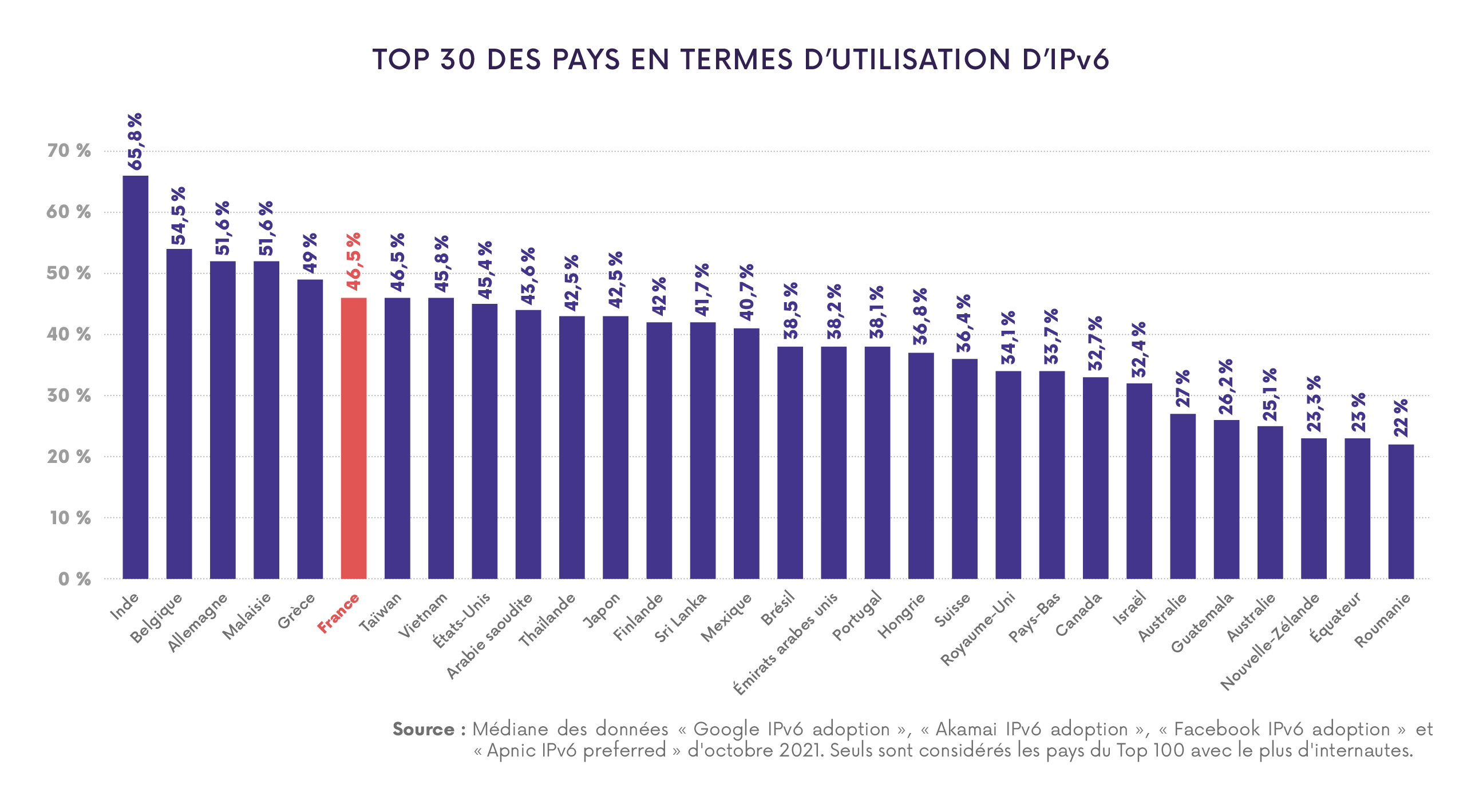The shortage of IPv4 addresses that was announced in late 2019 led some players to devise solutions to keep the internet running on IPv4, notably by enabling IPv4 address sharing. These solutions carry a set of risks, such as being denied access to a service or making it hard to identify someone based on an IP address during a criminal investigation, for instance.
Ultimately, prolonging the existence of an IPv4-based system will prevent the internet from growing. The transition to IPv6 is therefore the only future-proof solution to ensure that the internet remains a place of innovation and competitiveness. The Barometer of the transition to IPv6, the “IPv6 task force” and the handbook for businesses are all Arcep initiatives designed to promote and facilitate this evolution that is crucial to ensuring that the internet continues to run smoothly.
The 2021 edition of the Barometer of the transition to IPv6: despite significant progress (France ranks fourth in Europe), the transition is far from complete
The Barometer of the transition to IPv6 looks at all the players along the internet chain, and the progress they are making in their transition to IPv6. It details the status of deployments and includes the main operators’ forecasts for both fixed and mobile networks.
The 2021 edition reveals substantial progress in the transition to IPv6 in France, with a rate of adoption that has reached close to 50% [1]. France has thus moved well up the global rankings in terms of IPv6 adoption[2], going from 10th place at the end of 2020 to sixth place today. In Europe, France is in fourth place, behind Belgium, Germany, and Greece.
Despite these strides, once again this year Arcep ascertained that most of the internet ecosystem’s players are not planning for a transition to IPv6 that aligns with the pace and goals set for deployment. These players are thus urged to accelerate their transition.
On fixed networks, Arcep has observed sizeable disparities between the main telecom operators in France and is calling on them to step up their IPv6 deployment targets. Arcep notes significant progress on mobile networks but urges operators to maintain their efforts.
There remains a glaring lack of progress amongst web hosting companies. Only 20% of the three and a half million websites with .fr, .re, .pm, .yt, .tf and .wf domain names are currently IPv6-enabled [3]. Even if most of the websites that are IPv6-ready remain accessible in IPv4, there is a growing number of websites with public facing IPv6 addresses (around 1,000 domain names, or twice as many as in 2020). The situation amongst mail servers remains alarming, with only 7% of them being IPv6-ready.
The IPv6 task force, which Arcep created in partnership with Internet Society France, is publishing a second handbook: “A business’s guide to the IPv6 transition”
Created in November 2019, the IPv6 task force is open to all internet ecosystem stakeholders (operators, hosting companies, businesses, public sector players, etc.). Its goal is to help accelerate the transition to IPv6 by enabling participants to tackle specific problems and share best practices. The most pressing issue the task force identified was how to encourage businesses to make the transition to IPv6. To this end, it published a first handbook: “Businesses: why switch to IPv6?”. Today the task force is publishing a second handbook aimed chiefly at companies’ IT experts, to help them make the transition to IPv6. Its aim is to assist them in defining their IPv6 needs, planning the protocol’s implementation, and deploying it in-house.
If you would like to be part of this work going forward, please join the task force.
Associated documents:
- 2021 Barometer of the transition to IPv6 in France
- “A business’s guide to the IPv6 transition” (published in November 2021)
- Handbook “Businesses: why switch to IPv6?” (published in December 2020)
Notes :
[1] According to Google IPv6 adoption
[2] According to the median of Google IPv6 adoption “, “Akamai IPv6 adoption” , “Facebook IPv6 adoption” , “ data for October 2021. Based on the 100 countries with the most internet users.
[3] AFNIC data, August 2020

